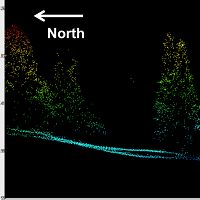Community Workshop: The Next Generation of LiDAR Analysis fo
Community Workshop: The Next Generation of LiDAR Analysis for Critical Zone Research
Where: Boulder, CO, USA
University of Colorado Boulder Campus. Guggenheim (Geography building)
When: May 12th-14th, 2014. Arrival on May 11th. Begins 8 am Monday May 12th. Ends 4 pm Wednesday May 14th.
Who: The target audience is early career Earth scientists that actively use LiDAR in their research. All disciplines within Critical Zone science are encouraged to apply (e.g. geomorphology, hydrology, pedology, ecology, etc.). Participants with a background in LiDAR and/or their own processing techniques will be given preference. The workshop is capped at 32 participants. All invited participants will have lodging, airfare, and food covered by a grant from the National Science Foundation.
To apply, please contact Dr. Adrian Harpold, University of Colorado (adrian.harpold@colorado.edu) with your CV and a short letter of interest prior to March 15th, 2014.
What and Why: The collection of LiDAR datasets from the Earth surface is increasing exponentially, providing an unprecedented amount of data for scientists and researchers. However, there is consensus that the tools/techniques for extracting information from these datasets are lacking. The goal of this workshop is to expose early career CZ scientists to new LiDAR processing techniques to develop a vision for advancing their own research and the broader CZ science using LiDAR datasets. Using a combination of instruction, hands-on projects, and group discussion the workshop will provide an excellent platform for learning about the state-of-the-art LiDAR processing techniques and interaction with an engaged, multi-disciplinary group of researchers.
The three-day workshop is roughly divided into a day of instruction, a day of group projects, and a day of discussion and writing. The first day will include presentation from NCALM and UNAVCO on the technical aspects of LiDAR collection and processing. This will be followed by short presentations where processing techniques are introduced to the group (hands-on in a computer lab). The second day will be spent working in small groups that will be given datasets and processing techniques to examine three topics: 1. Examining emergent processes and features across spatial scales, 2. Verifying and parameterizing physical models, and 3. Assessing CZ change with multiple LiDAR datasets. On the final day of the workshop a discussion will ensue based on small group results and previous instruction. We will develop a paper outlining our vision for using LiDAR datasets to advance CZ science over the next five years to be published in a peer-reviewed journal.
There will also be time to enjoy Boulder during group dinners on Monday and Tuesday night. Colorado is beautiful in May and Boulder is highly accessible via public transportation and bicycle.
Please direct questions to Dr. Adrian Harpold (adrian.harpold@colorado.edu).
Discipline Tags, CZOs, and Links
All Disciplines
Data Management / CyberInfrastructure
GIS / Remote Sensing
Modeling / Computational Science
National
Explore Further

